Cooper Meshew has certainly had his ups and downs in his 19 years but, right now, he is up – way up in the seat of a John Deere row crop tractor in Valentine, Nebraska.
Cooper, who was diagnosed at age 10 with Charcot-Marie-Tooth (CMT), a degenerative nerve disease, checked off a “bucket list” item when he was hired in April with the custom harvesting company, Danielski Farms Inc. Cooper and his crew have since traveled to Kansas, Oklahoma, and Texas harvesting wheat, corn, soybean and other crops.
“With a lot of people at Akron Children’s behind me, I’ve been able to do this,” said Cooper. “Come out here and live the dream of driving tractors and helping to feed America and the world.”
This particular John Deere weighs 30,000 pounds and pulls a grain cart that holds 1,100 bushels or close to 90,000 pounds when full.
“If that’s wheat, that’s enough to make 42,000 loaves of bread,” said Cooper.
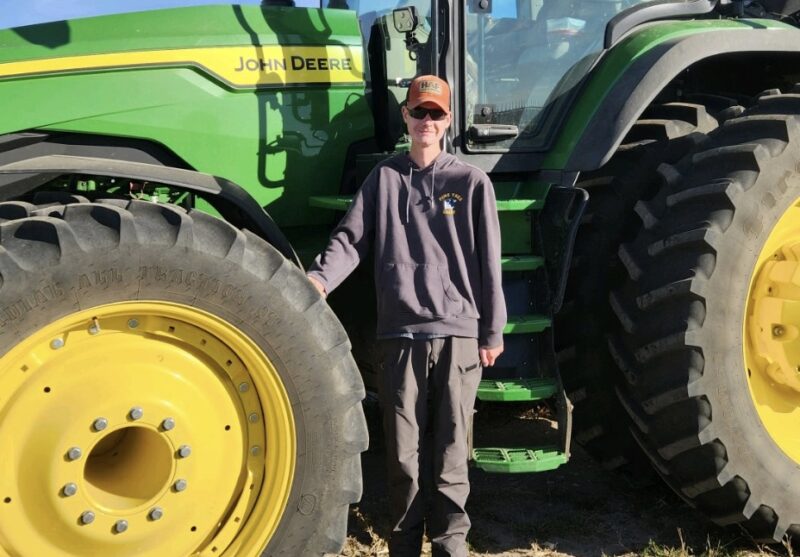
Wooster native Cooper Meshew has not let his special needs prevent him from pursuing his “bucket list” job.
Because today’s combines are too expensive to own, farmers hire companies to do their harvesting. That’s where crews like Cooper’s come in – they travel the “American Wheat Trail” helping clients with their harvest.
Although Cooper grew up a “city kid” in Wooster, all his early jobs were on nearby farms, and he loved the lifestyle. But he knew farming operated on a much bigger scale out west.
“As a little kid, I would see this photo of a combine and a big line through the flat plains of Kansas,” he said. “I remember thinking, ‘That would be cool to go and be part of that.’”
After getting his associate degree in crop management from Ohio State University, Cooper started his own lawn care company. But the idea of working on a custom harvest crew still burned bright.
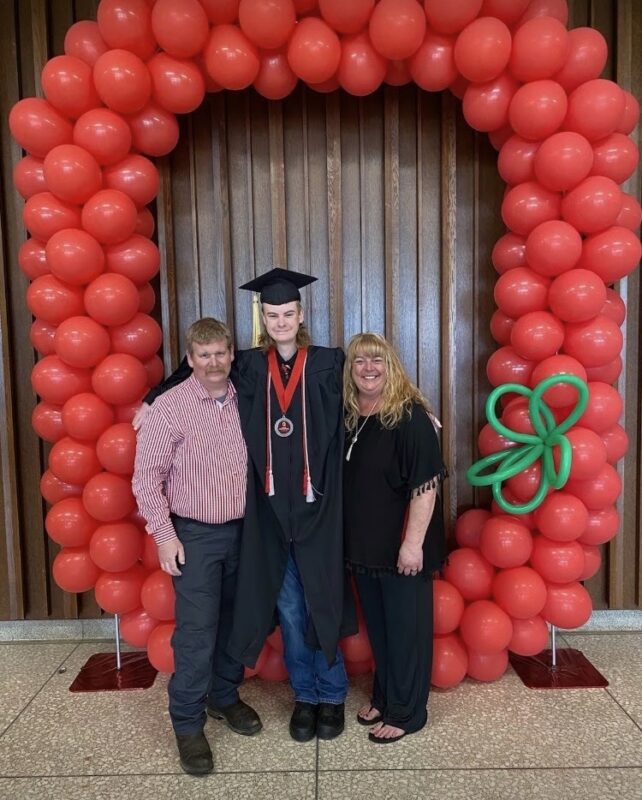
Cooper Meshew, with parents, Scott and Heidi, at his OSU graduation.
Cooper shared his interest on a harvesting group Facebook page and within an hour had about 18 companies reaching out with invitations for interviews.
He was upfront about his physical challenges. He has limited use of his right hand and arm and needs adaptive equipment for tasks ranging from putting on his boots to steering a vehicle. In December, Dr. Todd Ritzman performed spinal fusion surgery on Cooper to correct scoliosis that had rapidly progressed from a 20- to a 45-degree curve in just a few years.
“I have two 15-inch rods and 17 screws in my back,” said Cooper, “but once I got through the healing, I felt so much better. I always hurt when I sat on an airplane or in a car seat and now, I can sit for long periods of time and not have back pain.”
“The CMT is still progressing,” said Cooper. “I’ve pretty much lost all use of my right hand and arm and the drop foot is a wonderful way of falling out of tractors unexpectedly. I wear a high-ankle work boots that give me enough support to walk without leg braces.”
Cooper benefits from other adaptive equipment such as a V-grip that allows him to safely maneuver a steering wheel, whether it’s a standard car or industrial farm tractor. He also has a supportive manager and crew. In fact, Cooper said the manager who hired him said he was more concerned about employees with “attitude disabilities” rather than “physical disabilities.”
Cooper thinks he will continue with his job for the near future.
“It’s a great way to see the country, and about the time you are tired of one place, you are on the road again moving somewhere completely new. It’s a large adventure.”
Cooper especially loved Texas, where one ranch alone was bigger than the state of Rhode Island.
“Texas is completely flat so you can see for 20 or 30 miles,” he said. “Everything is bigger there. On harvest, we were working with anywhere between 5 and 7 combines and that’s just unbelievable for an Ohio kid to see that much equipment in one field.”
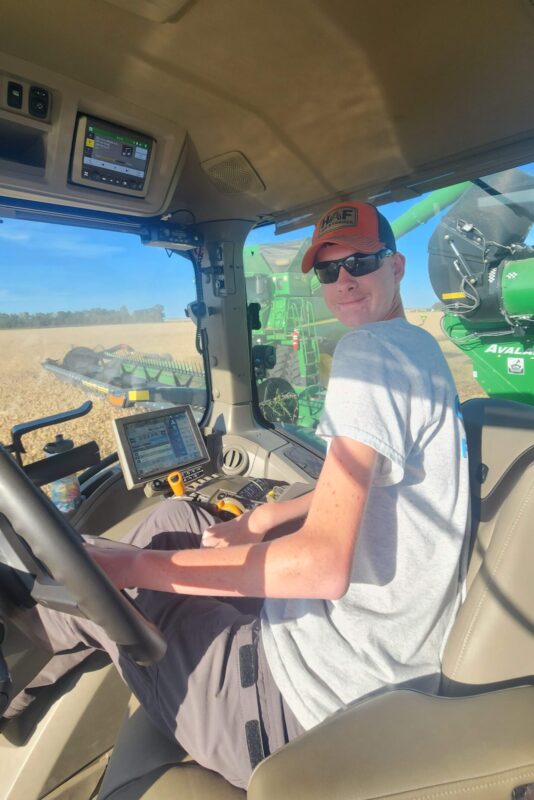
Cooper, inside a John Deere 8R 310 row crop tractor in Nebraska.
From beautiful sunrises over farmland to giving viewers “virtual” rides behind the seat his tractor, Cooper has been sharing his custom harvesting experiences on social media. His YouTube channel, “Harvesting the Sarcasm,” with a lively country music soundtrack, gets thousands of views, and he is also on Facebook and Instagram under the same name.
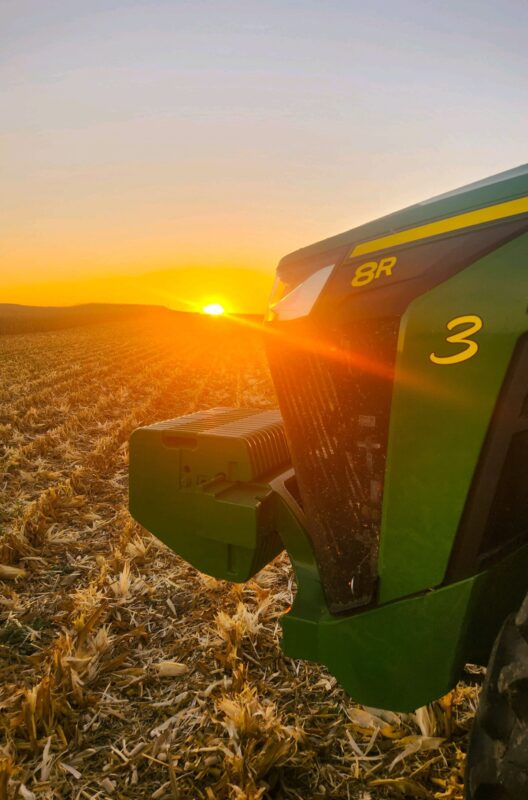
One of the scenic farm photos Cooper posts to his social media accounts.
“I try to keep it very family friendly and very friendly to people who know nothing about farming,” he said. “I just try to explain what goes on day-to-day in the life of a farmer.”
Cooper remembers it was his difficulty in putting on gloves that led him and his parents, Heidi and Scott, on his diagnosis journey with Akron Children’s NeuroDevelopmental Science Center team.
For a young boy, the three-words that changed his life, “Charcot-Marie-Tooth,” sounded more like “shark’s tooth.”
Cooper said the diagnosis came with feelings of anger, sadness and uncertainty about his future.
“As I have grown older, it’s kind of, well, you can’t shake this, so just suck it up and move on. Let’s try to get something done,” he said. “I have my moments, but I look at every day as a blessing to be able to live and do what I want to do. There’s probably a day where I won’t be able to do this anymore, but I can just make the most out of it while I can.”
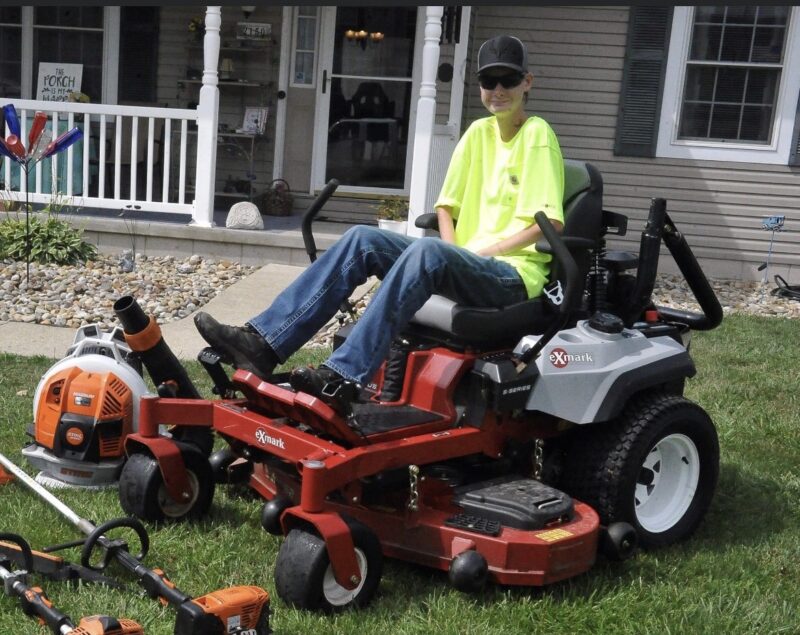
While still a teen, Cooper started a successful lawn care business in his hometown.










